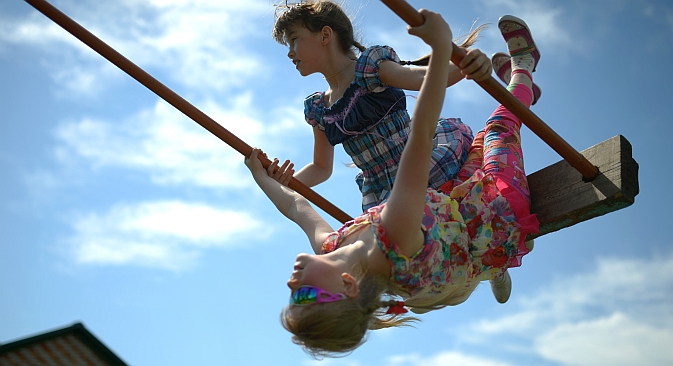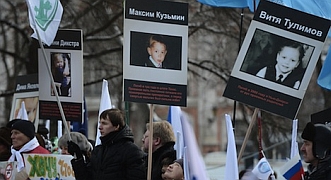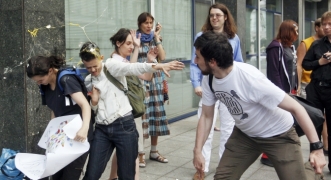State Duma moves to ban adoption by homosexuals abroad

Russian orphans in the yard of a high school in the town of Ivankino, the Novosibirsk Region. Source: RIA Novosti / Alexander Kryazhev
On Tuesday, June 18, the lower house of the Russian parliament (the State Duma) passed a bill to prevent gay married couples from other countries and single people from countries where gay marriage is legal from adopting Russian orphans. The bill was passed by 443 votes out of 450.
The bill comes just after French President François Hollande signed gay marriage into law on May 18.
“The West will first run this social experiment on children at home, and Russia won’t be involved,” said one of the authors of the bill, Elena Mizulina, who heads of the State Duma committee on women and children.
Mizulina believes that additional guarantees should be introduced, in order to prevent Russian children from ending up in gay families as a result of re-adoption, which is allowed under the Russian-French adoption agreement.
Lawyer Anton Zharov, who specializes in adoption cases, wonders why Russia needs such a law.
“I can’t even imagine a judge allowing a French gay couple to adopt a Russian child if this runs counter to the contemporary vision of family values in Russia,” Zharov said in an interview with Dozhd TV. “I haven’t heard of a single gay couple from France seeking to adopt from Russia.”
More:
Russian children's rights ombudsman wants to end foreign adoption
Zharov believes that foreign adoption is acceptable only if a specific child enjoys specific benefits, and if the only option for this child in Russia is the orphanage.
The Russian Orthodox Church supports the move to ban adoption by same-sex couples.
“The recent decision by some countries to acknowledge same-sex cohabitation and offer gay couples equal adoption rights with families is the final phase in the lengthy process of abandonment of chastity, abstinence and conjugal fidelity,” said the spokesperson for the Russian Orthodox Church, Vladimir Legoida. “The experiments that some societies make with their children, who are placed in relationships founded on what church perceives as a sin, are heinous.”
In a recent interview with REN TV, Elena Mizulina called for adopted children to be withdrawn from Russian gay couples.
Mizulina is the author of a number of recent, high-profile initiatives, including the bill to ban promotion of unconventional sexual relations (homosexuality and bisexuality) and transsexualism among minors; the bill was passed in its third reading on June 11.
The Magnitsky Act, passed by U.S. President Obama in December 2012, is named after the lawyer Sergei Magnitsky, who died in 2009 (allegedly following torture) while in a Moscow pre-trial detention facility. The act imposed a visa ban on Russian officials and other persons deemed responsible for human rights violations in Russia, and whose activities are not subject to investigation by Russian law-enforcement agencies. Also, such persons are prohibited from holding accounts with U.S. banks.
Likewise, in late 2012, a Mizulina-led committee voiced its support for the law that imposes a ban on adoption by Americans, in response to the Magnitsky Act passed by Washington.
The Russian law that denounced the Russian-American adoption agreement effective November 1, 2012, was named after Dima Yakovlev – a Russian toddler who was adopted in the United States and died in July 2008, after being left alone in the burning sun in his adoptive father’s car. The adopter was acquitted by an American court in December 2008.
The Duma considered a total ban on foreign adoption when discussing the prohibition of adoption by gay couples; however, a less severe option was approved.
Over the last 12 years, same-sex marriages have been legalized in Argentina, Belgium, Brazil, Denmark, Iceland, Spain, Canada, the Netherlands, Norway, Portugal, Sweden, South Africa and 14 U.S. states. In August, Uruguay and New Zealand were added to the list.
In 2012, about 58 percent of Russian orphans adopted by foreigners went to those countries.
According to the All-Russia Public Opinion Research Center, the share of Russians supporting a complete ban on foreign adoption doubled to 64 percent in 2013, up from 32 percent in 2005.
Meanwhile, the number of children adopted by Russian citizens fell to 6,565 in 2012, down from 9,530 in 2007. Adoption by foreigners peaked in 2004, with 9,419 Russian orphans adopted; but the number has been falling since then. Last year, 2,604 Russian orphans were adopted by foreigners.
The number of children transferred to guardians and foster families – where they will live up to the age of 18 – fell to 46,000 in 2012, down from 50,000 in 2011.
According to Deputy Prime Minister Olga Golodets, more than 118,000 Russian orphans are currently subject to adoption, and the number of orphans keeps rising.
All rights reserved by Rossiyskaya Gazeta.
Subscribe
to our newsletter!
Get the week's best stories straight to your inbox

